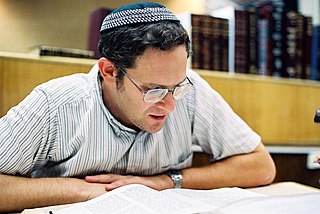
Modern Orthodox Judaism is a movement within Orthodox Judaism that attempts to synthesize Jewish values and the observance of Jewish law with the modern world.

Abraham Isaac Kook, known as HaRav Kook, and also known by the Hebrew-language acronym Hara'ayah, was an Orthodox rabbi, and the first Ashkenazi Chief Rabbi of British Mandatory Palestine. He is considered to be one of the fathers of religious Zionism and is known for founding the Mercaz HaRav Yeshiva.

Agudath Israel of America is an American organization that represents Haredi Orthodox Jews. It is loosely affiliated with the international World Agudath Israel. Agudah seeks to meet the needs of the Haredi community, advocates for its religious and civil rights, and services its constituents through charitable, educational, and social service projects across North America.
The National Religious Party, commonly known in Israel by its Hebrew abbreviation Mafdal, was a political party in Israel representing the religious Zionist movement.

Meir Bar-Ilan was an orthodox rabbi, author, and religious Zionist activist, who served as leader of the Mizrachi movement in the United States and Mandatory Palestine. Bar-Ilan University, founded in 1955, was named in his honour.

The Mizrachi is a religious Zionist organization founded in 1902 in Vilnius at a world conference of religious Zionists called by Rabbi Yitzchak Yaacov Reines. Bnei Akiva, which was founded in 1929, is the youth movement associated with Mizrachi. Both Mizrachi and the Bnei Akiva youth movement continued to function as international movements. Here the word "Mizrahi" is a notarikon for "Merkaz Ruhani" lit. Spiritual centre: מרכזרוחני, introduced by rabbi Samuel Mohilever.
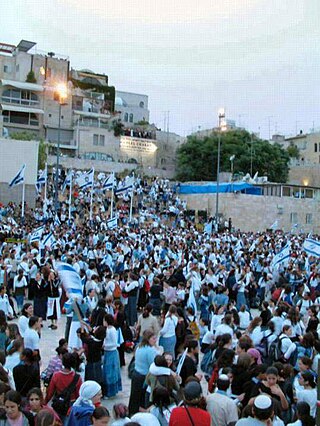
Religious Zionism is a religious denomination that views Zionism as a fundamental component of Orthodox Judaism. Its adherents are also referred to as Dati Leumi, and in Israel, they are most commonly known by the plural form of the first part of that term: Datiim. The community is sometimes called 'Knitted kippah', the typical head covering worn by male adherents to Religious Zionism.

The Soloveitchik dynasty of rabbinic scholars and their students originated the Brisker method of Talmudic study, which is embraced by their followers in the Brisk yeshivas. It is so called because of the Soloveitchiks' origin in the town of Brisk, or Brest-Litovsk, located in what is now Belarus. Many of the first Soloveitchik rabbis were the official rabbis of Brisk, and each in turn was known as "the Brisker Rov". Today, Brisk refers to several yeshivas in Israel and the United States founded by members of the Soloveitchik family, including the yeshivas of R’ Avraham Yehousua Soloveitchik and the late R’ Dovid Soloveitchik, among others.
World Agudath Israel, usually known as the Aguda, was established in the early twentieth century as the political arm of Ashkenazi Torah Judaism. It succeeded Agudas Shlumei Emunei Yisroel in 1912. Its base of support was located in Eastern Europe before the Second World War but, due to the revival of the Hasidic movement, it included Orthodox Jews throughout Europe. Prior to World War II and the Holocaust, Agudath Israel operated a number of Jewish educational institutions throughout Europe. After the war, it has continued to operate such institutions in the United States as Agudath Israel of America, and in Israel. Agudath Israel is guided by its Moetzes Gedolei HaTorah in Israel and the USA.

Pinchas Kehati was a Polish-Israeli rabbi, teacher, and author. He is best known as the author of Mishnayot Mevoarot which is a commentary and elucidation on the entire Mishnah written in Modern Hebrew.

Samuel Mohilever, also Shmuel Mohilever, was a rabbi, pioneer of Religious Zionism and one of the founders of the Hovevei Zion movement.
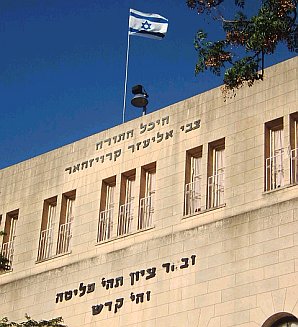
From the founding of political Zionism in the 1890s, Haredi Jewish leaders voiced objections to its secular orientation, and before the establishment of the State of Israel, the vast majority of Haredi Jews were opposed to Zionism, like early Reform Judaism, but with distinct reasoning. This was chiefly due to the concern that secular nationalism would redefine the Jewish nation from a religious community based in their alliance to God for whom adherence to religious laws were "the essence of the nation's task, purpose, and right to exists," to an ethnic group like any other as well as the view that it was forbidden for the Jews to re-constitute Jewish rule in the Land of Israel before the arrival of the Messiah. Those rabbis who did support Jewish resettlement in Palestine in the late 19th century had no intention to conquer Palestine and declare its independence from the rule of the Ottoman Turks, and some preferred that only observant Jews be allowed to settle there.
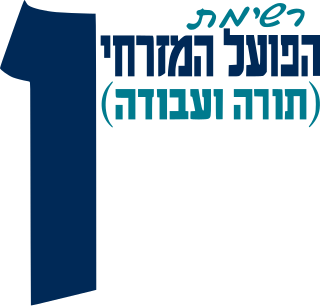
Hapoel HaMizrachi was a political party and settlement movement in Israel. It was one of the predecessors of the National Religious Party and the Jewish Home.

Yitzchak Yaacov Reines, was a Lithuanian Orthodox rabbi and the founder of the Mizrachi Religious Zionist Movement, one of the earliest movements of Religious Zionism, as well as a correspondent of Theodor Herzl.

Ahron Dovid Burack was a Lithuanian-American rabbi and rosh yeshivah.

The common definition of Zionism was principally the endorsement of the Jewish people to establish a Jewish national home in Palestine, secondarily the claim that due to a lack of self-determination, this territory must be re-established as a Jewish state. Historically, the establishment of a Jewish state has been understood in the Zionist mainstream as establishing and maintaining a Jewish majority. Zionism was produced by various philosophers representing different approaches concerning the objective and path that Zionism should follow. A "Zionist consensus" commonly refers to an ideological umbrella typically attributed to two main factors: a shared tragic history, and the common threat posed by Israel's neighboring enemies.
Isaac Stollman was a noted rabbi, author and religious Zionist leader.
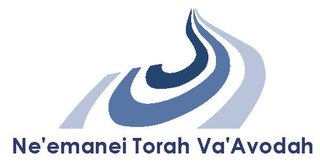
Ne’emanei Torah Va’Avodah is a nonprofit organization in Israel that focuses on education research and policy in the Religious Zionist community. The organization supports democratizing the State-controlled religious services, so that the public plays a greater role in religious decision making and functions.
The Streams Method in the Israeli education refers to the division of education in Israel into ideological and party-based streams. This method was practiced in the Jewish settlement in the Land of Israel and later among the Jewish public in the State of Israel from the beginning of modern education until the enactment of the State Education Law on August 12, 1953. There were three main educational streams: the Labor, General, and Mizrahi (Oriental) streams, in addition to one recognized as official after the establishment of the state, the Agudat Israel stream. Additionally, Talmud Torah schools and Kol Israel Chaverim institutions remained non-partisan.















